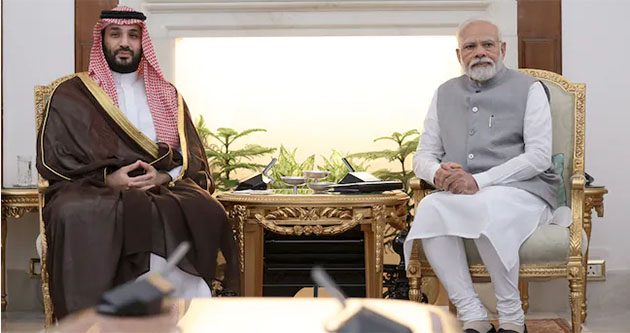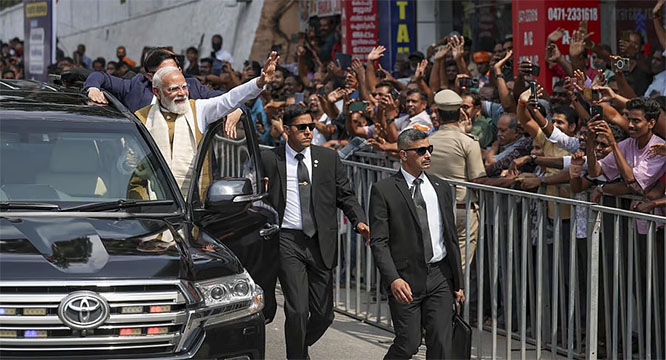
New Delhi, Sept 11: Trade, economy, defence, and cultural cooperation were the main topics of discussion between Prime Minister Narendra Modi and Saudi Arabia's Crown Prince Mohammed bin Salman Al Saud during the latter's State visit today.
During the high-profile meeting today at Delhi's Hyderabad House, the two leaders co-chaired the first leaders' meeting of the Strategic Partnership Council, a bilateral agreement between India and Saudi Arabia signed by the two nations in Riyadh in 2019.
"For India, Saudi Arabia counts as one of its closest and biggest strategic partners," PM Modi said. "India-Saudi Arabia partnership crucial for stability, welfare of region and world."
"We are adding a new dimension to our ties in tune with changing times. We have identified several initiatives to take our close partnership to the next level," he added.
The leaders assessed the progress of the two ministerial committees of the Strategic Partnership Council, namely the Political, Security, Social and Cultural Cooperation Committee and the Economy and Investments Cooperation Committee. They also discussed all aspects of bilateral relations, including political, security, defence, trade, economy, culture, and people-to-people ties. Additionally, they discussed regional and international issues of mutual interest.
Prince Salman's 2nd State Visit
The Saudi Arabian Crown Prince was accorded a ceremonial reception at Rashtrapati Bhavan at 10 am, ahead of his meeting with PM Modi at 11 am.
"I am very glad to be here in India. I want to congratulate India for the G20 Summit," the Crown Prince said.
After concluding his engagements with PM Modi and other dignitaries, Prince Salman will meet President Droupadi Murmu at Rashtrapati Bhavan at 6:30 PM before departing from New Delhi at 8:30 PM.
This is Prince Salman's second State visit to India.
During the two-day G20 Summit in New Delhi, Saudi Arabia was one of the signatories to the ambitious India-Middle East-Europe Economic Corridor.
The initiative, seen by many as a potential alternative to China's Belt and Road Initiative, was jointly announced by PM Modi and the leaders of the United States, Saudi Arabia, the United Arab Emirates, France, Germany, Italy, and the European Union on the sidelines of the G20 summit.
"Yesterday, we took a decision to start a historic economic corridor between India, West Asia and Europe. This corridor will not only connect two countries but also help in providing economic growth, and digital connectivity between Asia, West Asia and Europe," PM Modi said.
Once completed, the project can serve as a modern-day Silk Road that functioned as the central trade route facilitating economic partnerships, political alliances, and cultural integration across continents.
Prime Minister Modi also cited Saudi Arabia's 'Vision 2030' initiative, an all-encompassing nationwide reform programme launched in 2016 for the economic, cultural and architectural development of the Middle Eastern country.
"Under your leadership and Vision 2030, Saudi Arabia has seen tremendous economic growth and I congratulate you for that," PM Modi said.
India-Saudi Arabia Ties
India and Saudi Arabia have a long history of cordial and cooperative relations, with extensive people-to-people ties. According to government data, bilateral trade between the two countries reached an all-time high of USD 52.75 billion in fiscal year 2022-23.
PM Modi during his 2019 visit to Riyadh had said that India and Saudi Arabia have a Joint Committee on Defence Cooperation (JCDC) that meets regularly and that the two countries have identified a number of areas of mutual interest and cooperation in the field of defence and security.
The two economic powerhouses are also major trading partners. India is Saudi Arabia's second-largest trading partner, while Saudi Arabia is India's fourth-largest. The two countries have a strong partnership in the energy sector, with India importing a significant amount of oil from Saudi Arabia.







Comments
Add new comment